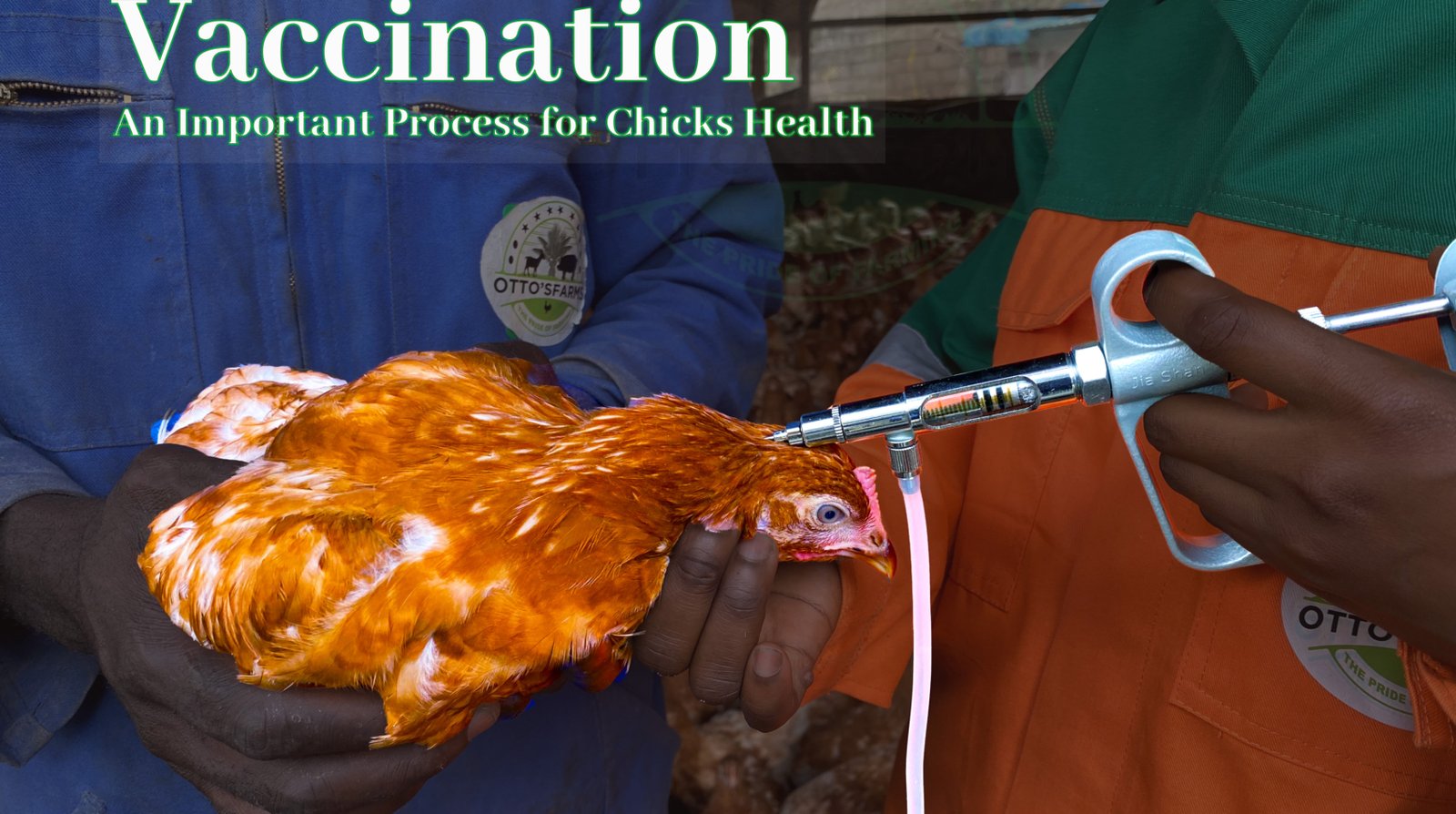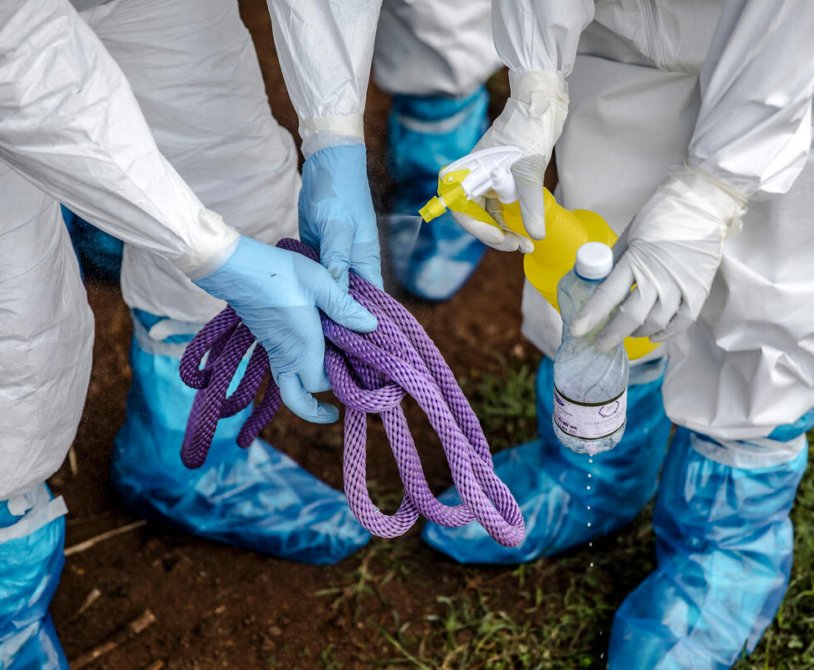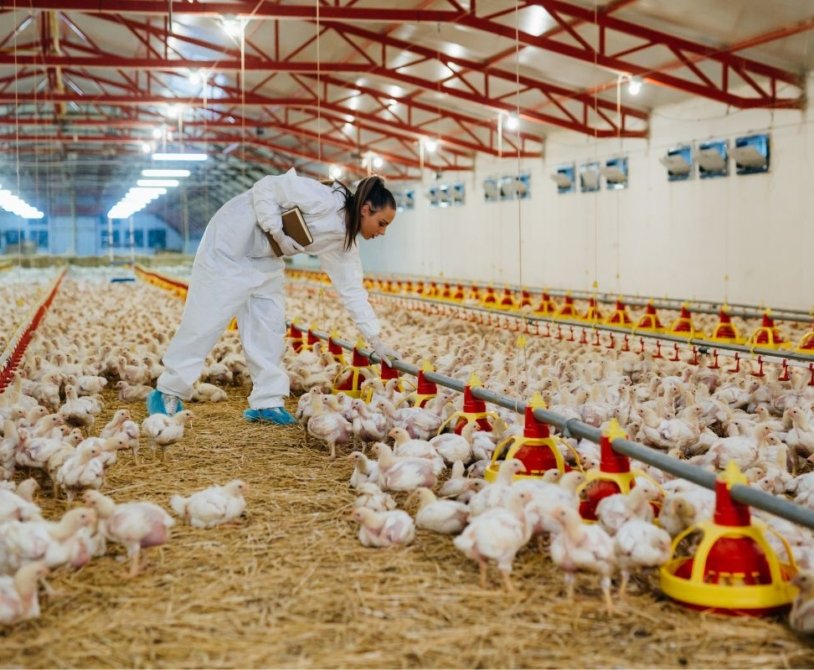The health and productivity of broiler chickens rely on good vaccination schedules. Vaccines protect them from deadly diseases. This ensures they grow well and are profitable. We will look at why vaccination schedules are important, the diseases they face, and how to keep them healthy.
Key Takeaways
- Vaccination schedules play a crucial role in maintaining the health and productivity of broiler chickens.
- Proper immunization protects flocks from devastating diseases, ensuring optimal poultry production and profitability.
- Understanding common poultry diseases and the role of vaccination in disease control is essential for effective flock management.
- Developing effective vaccination programs involves considering various factors, including vaccine types and administration methods.
- Integrating vaccination into a comprehensive broiler management strategy is key to ensuring the overall health and well-being of the flock.
The Importance of Vaccination Schedules for Broiler Chickens
Keeping up with vaccination schedules is key for broiler chicken farming. These schedules stop diseases from spreading, which is vital for the health of the flock. By sticking to a vaccination program, farmers can keep their chickens healthy and productive.
Vaccinating chickens on time is crucial for their health. It protects each bird and makes the whole flock stronger against diseases. This way, farmers can keep their chickens healthy and make more money.
| Key Benefits of Vaccination Schedules | Potential Consequences of Neglecting Vaccination |
|---|---|
|
|
Poultry farmers need to understand the importance of vaccination schedules for their chickens. By doing so, they can protect their flocks and keep their farms running smoothly. A good vaccination program is a smart and affordable way to ensure the success of broiler chicken farming.
Understanding Poultry Disease Prevention
Keeping broiler chickens healthy is key to successful poultry farming. It’s important to know about common diseases and how vaccines help fight them. Marek’s disease and avian influenza are just a few examples. Good prevention and treatment plans are vital for the health of the flock and better production.
Common Diseases Affecting Broiler Chickens
Broiler chickens face many diseases, including:
- Marek’s disease – A contagious virus that can cause paralysis, tumors, and more.
- Infectious bursal disease – Also known as Gumboro disease, it weakens the immune system, making birds more susceptible to other diseases.
- Newcastle disease – A contagious virus that can lead to breathing problems, nervous system issues, and death in flocks.
- Avian influenza – Different strains can cause mild to severe symptoms, even leading to major outbreaks.
The Role of Vaccination in Disease Control
Vaccination is vital in fighting these diseases. A good vaccination plan can help producers:
- Lower the chance of disease outbreaks in the flock.
- Improve the health and productivity of the birds.
- Reduce the cost of treatments and interventions.
- Protect the welfare of the animals and the quality of the product.
By being proactive with vaccination, producers can make their operations more profitable and sustainable. They also ensure the health and well-being of their flocks.
“Vaccination is a cornerstone of comprehensive poultry disease prevention, helping to protect broiler flocks and ensure the long-term viability of the industry.”
Broiler Chicken Health and Productivity
The health of broiler chickens is key to their productivity and profit. Keeping them healthy is vital for poultry producers. It ensures the chickens’ welfare and boosts the farm’s performance and yield.
Effective vaccination programs are crucial for broiler chicken health. They help prevent poultry diseases that can harm the flock’s immunity and productivity.
Following a vaccination schedule protects chickens from diseases like Marek’s, infectious bursal disease, and Newcastle disease. This builds strong flock immunity. It reduces the risk of outbreaks and keeps the chickens healthy and productive.
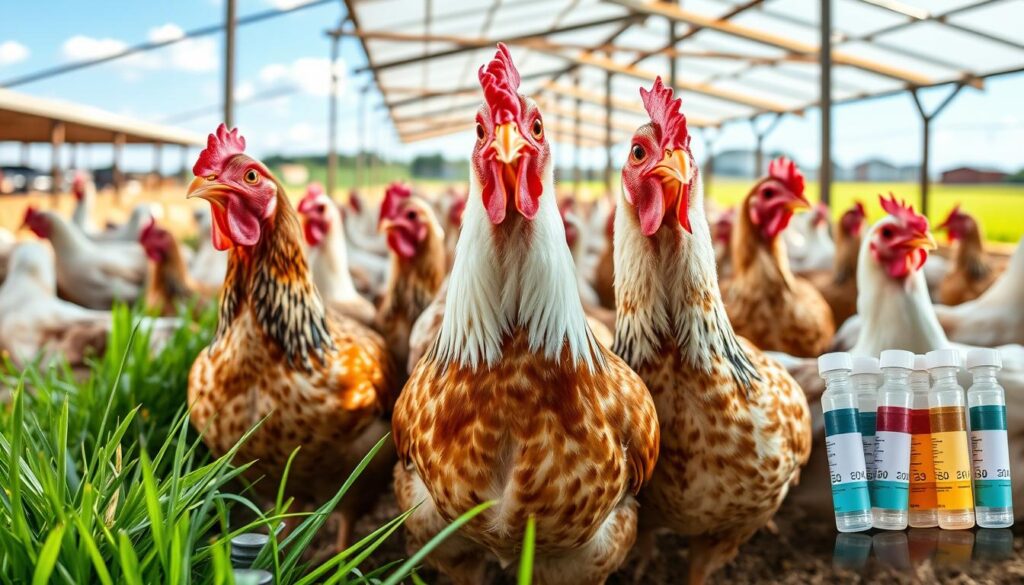
Adding vaccination programs to a broiler management plan can greatly improve growth, feed efficiency, and carcass quality. Healthy chickens grow better and faster. This boosts the farm’s profit.
Understanding the connection between broiler chicken health, vaccination programs, and productivity helps producers make better choices. This leads to sustainable success in the poultry industry.
Developing Effective Vaccination Programs
Creating successful vaccination programs for broiler chickens needs careful planning. It’s important to consider many factors. This way, poultry producers can keep their broiler flocks healthy and productive.
Factors to Consider in Vaccination Scheduling
The timing of vaccinations is key to protecting against diseases. Age of the birds, local disease rates, and expected disease pressure are important. A well-planned vaccination schedule can greatly improve broiler chicken health and lower poultry disease prevention risks.
Vaccine Types and Administration Methods
Poultry producers have many vaccination programs and ways to administer them. Each has its own benefits and challenges. Choosing the right vaccine type and method is crucial. It depends on the disease threats, desired vaccine efficacy, and practical aspects. Proper vaccine selection and administration are key to a successful broiler chicken health program.
“Integrating vaccination into a comprehensive broiler management plan is essential for maintaining flock health and productivity.”
By focusing on vaccination scheduling and choosing the right vaccines, poultry producers can create effective vaccination programs. These programs protect the health and productivity of their broiler flocks.
Marek’s Disease: A Crucial Vaccination
Marek’s disease is a viral infection that can harm broiler chicken flocks. It’s a big health worry for those who raise chickens for meat. Vaccinating against Marek’s disease is key to keeping chickens healthy and productive.
This disease is caused by a herpesvirus that attacks the chicken’s nervous system. It can cause paralysis, blindness, and other serious problems. It also leads to cancer and lymphoma in the bird’s organs. Without a vaccine, the disease can spread fast, causing many deaths and big losses for farmers.
But there are good vaccines to fight Marek’s disease. Chicks get vaccinated early, right after they hatch. This early shot helps them fight off the virus for their whole lives.
Adding Marek’s disease vaccine to a disease prevention plan is very important. It helps keep broiler flocks healthy and productive. By vaccinating all chickens, farmers can protect their flocks from this dangerous virus.
In short, Marek’s disease vaccine is a must for keeping chickens healthy. By focusing on this vaccine, farmers can keep their flocks thriving. This helps their farms succeed and stay strong over time.
Infectious Bursal Disease: Protecting Flock Immunity
Infectious bursal disease is a big worry for broiler chicken health. This virus is very contagious and can weaken the birds’ immune system. This makes them more likely to get other serious diseases. It’s important to understand this threat and use good vaccination plans to keep the flock healthy.
Understanding Infectious Bursal Disease
Infectious bursal disease, also known as Gumboro disease, attacks the bursa of Fabricius in young chickens. This organ is key to building their immune system. The virus can destroy it, making it hard for the birds to fight off infections.
Outbreaks of this disease can cause big problems. They can lead to less production, slower growth, and more sickness from other diseases.
Vaccination Strategies for Infectious Bursal Disease
Strong vaccination programs are key to protecting broiler chickens from infectious bursal disease. Vaccination plans need to fit the flock’s needs. This includes the birds’ age, health, and the local disease risk.
Using both live and inactivated vaccines is best. This approach helps build strong immunity. It gives quick protection and long-lasting defense.
| Vaccine Type | Timing of Administration | Advantages |
|---|---|---|
| Live Vaccines | Early in life (1-14 days old) | Stimulate a rapid immune response, provide quick protection |
| Inactivated Vaccines | Later in life (2-4 weeks old) | Offer longer-lasting immunity, boost protection from live vaccines |
By being careful and using a good vaccination plan, broiler producers can keep their flocks safe. This ensures the best flock immunity and broiler chicken health.
Newcastle Disease: A Highly Contagious Threat
Poultry producers face a big challenge in keeping their broiler chicken flocks healthy. Newcastle disease is a major threat. It’s crucial to include Newcastle disease vaccination in a vaccination program for broiler chickens.
This disease spreads fast and can cause serious problems. Symptoms include breathing issues, less egg production, and high death rates. Without the right disease prevention, broiler chicken health can suffer greatly. This leads to big losses for poultry producers.
To fight Newcastle disease, a good vaccination program is key. Adding Newcastle disease vaccination to the vaccination schedule helps protect chickens. It keeps flocks healthy and productive.
“Proactive vaccination against Newcastle disease is a crucial component of any comprehensive poultry disease prevention strategy. It helps to ensure the long-term viability and success of broiler chicken operations.”
Adding Newcastle disease vaccination to the vaccination program shows the industry’s dedication. It aims to keep broiler chicken health and productivity high. By being proactive and using effective disease prevention strategies, producers can protect their flocks. This ensures the success of their operations.
Avian Influenza: Safeguarding Against Outbreaks
The avian influenza, or “bird flu,” is a big threat to broiler chicken farms. It’s important to know about the different virus strains and their risks. This knowledge helps in creating strong vaccination plans to keep broiler flocks safe and reduce outbreak impacts.
Avian Influenza Strains and Risks
Avian influenza comes from different types of the influenza A virus. Each type has its own risk level. The highly pathogenic strains, like H5N1 and H7N9, are very dangerous. They can make poultry very sick and even kill them. These strains can also spread to humans, which is a big health risk.
The less severe strains, known as low pathogenic avian influenza (LPAI), can still harm broiler chicken health. They can weaken the birds’ immune system. This makes them more likely to get other diseases and lowers their performance.
Vaccination Protocols for Avian Influenza
- Regular and thorough vaccination programs are key to protecting broiler chicken flocks from avian influenza.
- Vaccination plans should match the farm’s specific risks and challenges. This includes the common virus strains, farm safety measures, and the farm’s production cycle.
- Vets and poultry health experts are crucial in creating and carrying out effective vaccination plans. These plans should cover both HPAI and LPAI strains.
- Ensuring most of the flock is vaccinated and getting booster shots on time boosts their immunity. This helps them fight off avian influenza outbreaks better.
By being proactive and using strong vaccination programs, broiler chicken farms can protect their flocks from avian influenza. This helps keep the poultry industry healthy and productive.
“Effective vaccination is a critical line of defense against the threat of avian influenza in broiler chicken production.”
Vaccine Efficacy and Quality Control
It’s key to make sure vaccines work well in broiler chicken vaccination programs. This helps keep disease prevention and flock health top-notch. Keeping an eye on vaccine quality and how they’re stored and handled is crucial.
Groups that make rules are very important here. They make sure vaccines for broiler chickens are safe and strong. This keeps the health and work of the chickens safe.
Testing vaccine batches often is a must. It checks if they’re strong and work well. This helps farmers and vets choose the best vaccination programs for their broiler chickens.
| Vaccine Efficacy Factors | Importance |
|---|---|
| Proper Storage and Handling | Maintaining the integrity and potency of vaccines through optimal storage conditions and handling procedures. |
| Regulatory Oversight | Ensuring vaccines meet strict safety and quality standards set by governing bodies for poultry disease prevention. |
| Batch Testing and Monitoring | Verifying the potency and effectiveness of individual vaccine batches to inform vaccination strategies. |
Putting a focus on vaccine efficacy and quality control is smart. It lets poultry producers have strong vaccination programs. This keeps broiler chickens healthy and boosts business success.
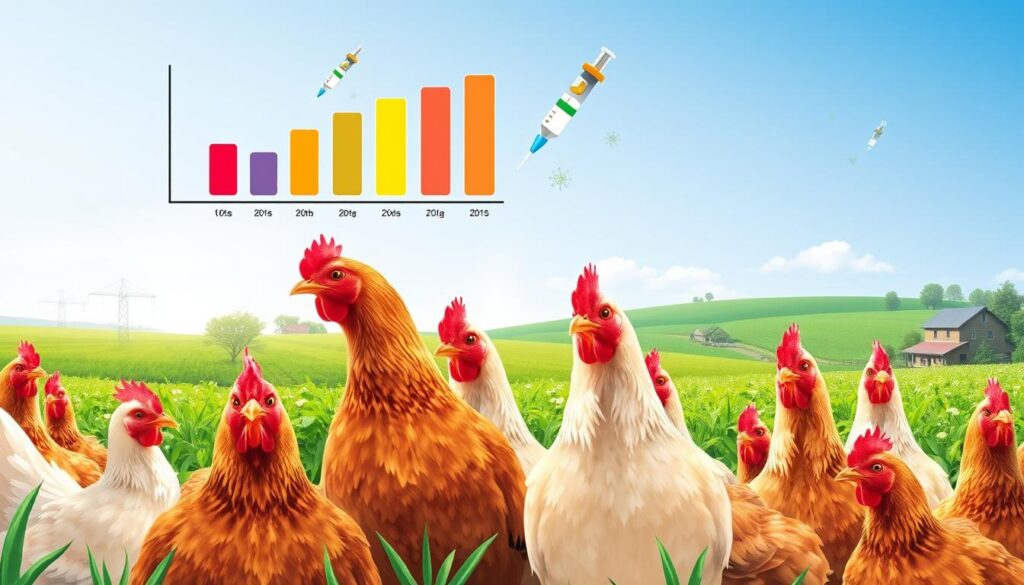
“Keeping our vaccination programs strong is key for our broiler chickens and our business. We must always watch over vaccine quality control closely.”
Integrating Vaccination into Broiler Management
It’s vital to include vaccination programs in broiler chicken care for the best health and productivity. By matching vaccination times with other key practices, like biosecurity measures and environmental control, producers can fight diseases effectively. This approach helps keep the flock healthy and strong.
Getting the timing right for vaccinations is crucial. Producers need to plan vaccination times with other important tasks. This ensures chickens get the most protection from vaccines. It also helps fight off common poultry diseases that could harm the flock.
Also, mixing vaccination with overall management lets producers see how well it works. By watching how vaccinations affect disease rates and flock immunity, they can improve their strategies. This way, they can keep their chickens healthier and more productive.
Finally, adding vaccination programs to broiler care is a big part of keeping chickens healthy and preventing diseases. By combining these efforts, producers can make their flocks thrive. This leads to better health and more success for their farms in the long run.
“Integrating vaccination into broiler management is not just about scheduling shots; it’s about creating a holistic approach to promoting flock health and productivity.”
Vaccination schedules are key in the poultry industry. They help protect broiler chicken health and prevent disease outbreaks. This approach also boosts flock productivity.
Understanding the importance of disease prevention and vaccination is crucial. Producers can improve their flocks’ immunity and health by taking proactive steps.
Vaccination is essential in broiler management. It fights diseases like Marek’s, Infectious Bursal Disease, and Newcastle Disease. Tailored vaccination plans and a focus on immunity are vital for success.
Staying updated on vaccination technology and strategies is important. This helps producers keep their operations viable and profitable. A holistic approach to health and productivity is key in today’s poultry industry.
FAQ
Why are vaccination schedules important for broiler chickens?
Vaccination schedules are key to broiler chicken health. They prevent diseases from spreading. This keeps the chickens healthy
What are some common diseases affecting broiler chickens?
Broiler chickens often get sick with diseases like Marek’s, infectious bursal disease, Newcastle disease, and avian influenza. These can harm the flock badly if not stopped.
How does vaccination play a role in disease control for broiler chickens?
Vaccination is vital for keeping broiler chickens safe from diseases. It helps prevent outbreaks and keeps the flock healthy and productive.
How does broiler chicken health and productivity relate to vaccination schedules?
The health of broiler chickens affects their productivity and profit. Vaccination schedules help keep them healthy. This ensures they grow well and perform well.
What factors should be considered when developing effective vaccination programs for broiler chickens?
When making vaccination programs, consider timing, diseases targeted, and how to administer the vaccines. A good plan is key to protecting the flock.
Why is Marek’s disease vaccination so important for broiler chickens?
Marek’s disease is very contagious and can harm broiler flocks a lot. Vaccinating against it is crucial. It keeps the chickens healthy and productive.
How does vaccination protect broiler chickens against infectious bursal disease?
Infectious bursal disease weakens the birds’ immune system. Vaccination is vital to protect them. It keeps the flock healthy and immune.
Why is Newcastle disease vaccination important for broiler chickens?
Newcastle disease is contagious and can hurt broiler chicken operations a lot. Vaccinating against it is important. It protects the flock from this disease.
How can vaccination help protect broiler chickens from avian influenza outbreaks?
Avian influenza is a big threat to broiler chicken farms. Vaccination is key to protecting the flock. It helps prevent outbreaks.
Why is vaccine efficacy and quality control important in broiler chicken vaccination programs?
Using effective and quality vaccines is crucial for disease prevention. Monitoring vaccine quality and following standards is important. It keeps the flock healthy.
How can vaccination be effectively integrated into broiler chicken management practices?
Vaccination should be part of overall broiler chicken management. It should match with other practices like biosecurity and environmental control. This approach keeps the chickens healthy and productive.


